
Joachim du Bellay was a French poet, critic, and a founder of La Pléiade. He notably wrote the manifesto of the group: Défense et illustration de la langue française, which aimed at promoting French as an artistic language, equal to Greek and Latin.
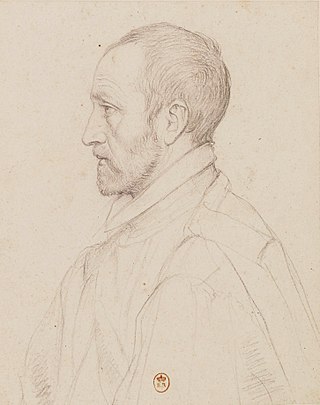
Jean Daurat was a French poet, scholar and a member of a group known as The Pléiade.

Étienne Jodelle, seigneur de Limodin, French dramatist and poet, was born and died in Paris of a noble family. Member of La Pléiade, he will strive to revitalize the principles of ancient Greek and Roman theater during the Renaissance. He was the first to introduce the alexandrine into tragedy in his time, notably with Cléopâtre captive, the first tragédie à l'antique, as well as L'Eugène in comedy. He is recognized as a precursor of the theater which was born in the second half of the 16th century, a convulsive period by Wars of Religion which saw its uncertainties embodied in his work.
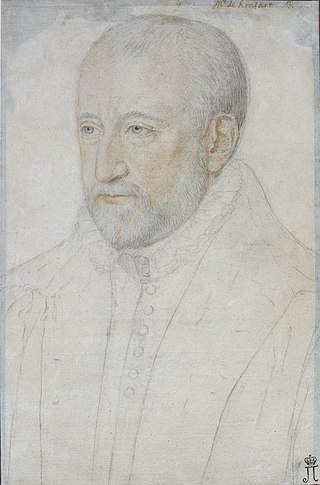
Pierre de Ronsard was a French poet know in his generation as a "prince of poets". His works include Les Amours de Cassandre (1552),Les Hymnes (1555-1556), Les Discours (1562-1563), La Franciade (1572), and Sonnets pour Hélène (1578).
La Pléiade was a group of 16th-century French Renaissance poets whose principal members were Pierre de Ronsard, Joachim du Bellay and Jean-Antoine de Baïf. The name was a reference to another literary group, the original Alexandrian Pleiad of seven Alexandrian poets and tragedians, corresponding to the seven stars of the Pleiades star cluster.
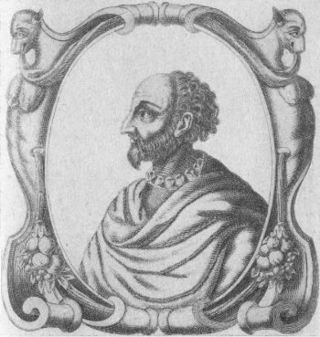
Jean Antoine de Baïf was a French poet and member of the Pléiade.
Jacques Pelletier du Mans, also spelled Peletier was a humanist, poet and mathematician of the French Renaissance.
French poetry is a category of French literature. It may include Francophone poetry composed outside France and poetry written in other languages of France.
French Renaissance literature is, for the purpose of this article, literature written in French from the French invasion of Italy in 1494 to 1600, or roughly the period from the reign of Charles VIII of France to the ascension of Henry IV of France to the throne. The reigns of Francis I and his son Henry II are generally considered the apex of the French Renaissance. After Henry II's unfortunate death in a joust, the country was ruled by his widow Catherine de' Medici and her sons Francis II, Charles IX and Henry III, and although the Renaissance continued to flourish, the French Wars of Religion between Huguenots and Catholics ravaged the country.

François de Belleforest was a prolific French author, poet and translator of the Renaissance.
The grands rhétoriqueurs or simply the "rhétoriqueurs" is the name given to a group of poets from 1460 to 1530 working in Northern France, Flanders, and the Duchy of Burgundy whose ostentatious poetic production was dominated by (1) an extremely rich rhyme scheme and experimentation with assonance and puns and (2) experimentation with typography and the graphic use of letters, including the creation of verbal rebuses. The group is also credited with promoting alternation between "masculine" rhymes and "feminine" rhymes.
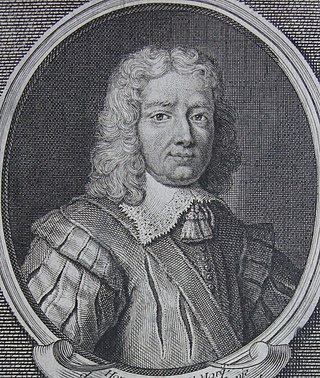
Honorat de Bueil, seigneur de Racan was a French aristocrat, soldier, poet, dramatist and a founding member of the Académie française.
Nationality words link to articles with information on the nation's poetry or literature.
Nationality words link to articles with information on the nation's poetry or literature.
Jacques Leguerney was a French composer especially noted for his art songs.
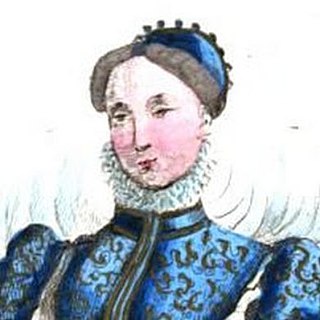
Catherine Fradonnet, called Catherine Des Roches, was a French writer of the Renaissance.
Madeleine Des Roches was a French writer of the Renaissance. She was the mother of Catherine Fradonnet, called Catherine Des Roches, to whom she taught poetry, literature and ancient languages. She is a writer in the tradition of Christine de Pizan and others, working to establish a community of women writers.
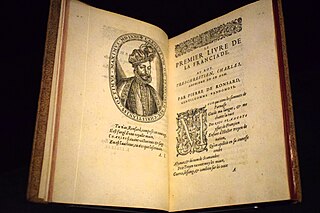
La Franciade is an unfinished epic poem written in decasyllabic verse by Pierre de Ronsard. Ronsard began writing the poem in the 1540s for Henry II of France, but it was only in 1572 that the poet published, now for Charles IX, the first four books of a planned twenty-four. Various reasons have been given to explain why the poem was never finished. Obviously, the death of his dedicatee Charles IX meant that Ronsard would have to have made certain changes. Another factor might have been the verse form: Ronsard wrote in decasyllables, not alexandrines. Other reasons, too, have been put forward. More recently, it has been stated that "[any] attempt to pin down why the Franciade was left unfinished, while potentially interesting, is probably futile" and that "we must read it despite [the fact it is unfinished], not as a fragment of what might have been, but as a text in its own right".

Étienne Tabourot, seigneur des Accords, also called Tabourot des Accords or Seigneur des Accords (1549–1590) was a French jurist, writer and poet of the Renaissance.
Marc-Claude de Buttet was a Renaissance poet, courtier and humanist. He formed part of the La Pléiade circle. He was lord of the feudal rent of Grésy in the province of Genevois.










